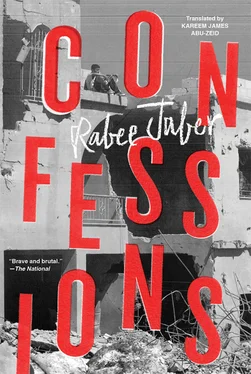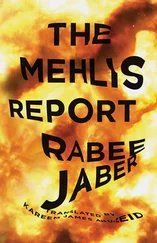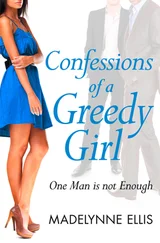Now I realize that was both memory and imagination — but how could I tell the two apart? I was reading Saint Augustine, thinking about the old days when the small buzzer went off in my room: I rushed down to the telephone room by the entrance to the building and picked up the phone, my heart beating faster than usual. I heard Ilya’s voice. The book still in my hand (it wasn’t mine, it belonged to one of my neighbors who read strange books, he told me about that one so I opened it… later on, I wound up reading it several times), I heard Ilya’s voice coming from a distance, from behind the demarcation line, from East Beirut.
In the Rizq Hospital, while they were cutting my father’s forehead open for the second time, Ilya told me we needed to prepare for the worst. I drank some water from a bottle and looked at the chairs across from me. The scene was repeating itself: we were sitting in the same waiting room as before, staring into the same emptiness. Even the gate that overlooked the trees was half-open, as it had been the last time. A feeling surprised me: the feeling of distance. It wasn’t just my body that had moved away from home. My mind had also begun to move away. Ilya was saying something, but I wasn’t paying attention — I was thinking about how it was midnight and that at this time I was usually standing on the fifth-floor balcony looking at the distant lights glistening on the hills, and at the lights of the fishing boats glistening on the open sea. I was thinking about how I always stood on the balcony at night — how I’d hear everyone scream the moment the electricity went out, how that strange force of joy emanated from the building — when Ilya told me what he hadn’t been able to tell me the last time.
“There’s something you should know.”
ILYA TOLD me I wasn’t myself: he said they found me on the demarcation line, bleeding from a wound in my chest. Later on, I’d hear the story I told you at the beginning (a car from West Beirut comes to an alleyway: something happens and gunfire rings out. Everyone in the car was killed except me. I was wounded in the chest, but I survived. I didn’t want to die). I listened to the story as I looked at the white cloth wrapped around the head of the man who’d carried me, bleeding, away from the demarcation line, the man I always thought was my father. Who was he? The wrap hid half his face — half his face, the top of his head, and one of his ears. And it hid parts of his neck too. Who was he? What did his one remaining eye see in his final days? I lost myself in distant places. I don’t know where I went after I found out. I remember walking on the campus streets and then leaving the paved road and walking among the trees: the grass and the soil and the dried leaves. The black stumps, a whitish color visible beneath the dead bark. Did I see anything? Who was I back then? Years later, I walked along that narrow path once more, among the trees that divided the upper part of campus from the lower. I saw green buds sprouting from the dead stumps that day, and flowers hidden in the grass, and I asked myself where he went, that person who walked this way years ago. Where did he go?
I want to tell you what happened to me, but I don’t know how. Can you imagine how I felt when they told me, after all those years, that I wasn’t myself? No one can express what’s inside of them, they do the best they can, but in the end they can’t actually express it. Now, when I try to find words to explain the feeling that came over me, I can only say this: “I was choking.”
As I left them, I felt two massive hands around my neck. I kept walking, farther and farther away, I crossed the demarcation line, I passed by buildings, I crossed roads and whole districts, but the grip around my neck held firm. It was as if their words had clogged my throat. “You’re my son,” the man said. Another voice said, “You’re my brother.” And the third voice, what did it say? All those voices were choking me. I ran away.
But I didn’t run away. I wanted some air. I wanted to breathe, but I couldn’t find any air. Maybe I wanted something else entirely: maybe I wanted to choke, to choke completely. When I remember myself back then, I remember two people, someone split in two. I don’t remember a single person.
The operation was a success. But the “success” only lasted four weeks. A third clot (the doctor said that was a possibility after the operation) killed the man who carried me from the demarcation line to his house in Achrafieh in 1976.
I went to his funeral. Ilya, who was crying, held my body between his arms. As I tell you this, I can see the stream of images in my mind. What is memory? Fields, yes, fields and palaces, caves and passageways. Right now I’m gathering up my memories and watching them flow, I’m plunging my hand into the stream and groping for one specific memory, as if looking for a polished stone that sleeps on the riverbed. That’s what I’m doing when I speak to you: I’m extracting the memories from the back rooms, I’m taking untrodden paths to try to find myself.
The same place. It was raining. Ilya, with my sisters. The black colors, and the priest speaking words that were lost among the raindrops. I didn’t go back to the house with them. I saw their faces from a distance, the rain was falling between us, and they were behind that glistening sheen. I left when they approached me. I went farther and farther away, I crossed the demarcation line, passing buildings and crossing roads and whole districts. I walked and walked.
When I sat on the bench beneath the trees of the campus, I felt cold. The rain was pouring down on me. Now, as I close my eyes, I can see myself there, and I don’t see just one person. I see myself as two, as if I’d been split into two creatures, as if I weren’t a man. After a while the rain stopped falling. I remember the orange light flooding the old building across from me, flooding the green plants that were creeping up the walls of the building, flooding the red bricks. The clouds subsided at sunset, and the cats came out and gathered on a patch of red light. But the rain was still falling inside my head. The man beneath the earth. Who was he? I sat on the bench under the trees. Who was I? I pressed my hands against my pants, I squeezed the water out of my clothes.
For a long time I couldn’t breathe. Two people were struggling in my chest, I didn’t know who they were, I didn’t know how it would all end. I’m trying to tell you, but I know I can’t.
I went to my classes and took notes from the lectures and went back to my room. I read what I’d written without understanding any of it, as if I’d forgotten the English language. Even the numbers, even the mathematical equations, even the symbols I knew so well, I no longer understood any of them. (Maroun used to know those things, but how could I know them? I? Who was that?)
That was the worst period of my life ( my life? whose life?). I spent countless days hunched over my desk, copying out dark equations on a white page, a page that soon turned black: I wrote line after line, but the equations refused to reveal their secret. Antoine used to slide open the door to my room when he came back from the cafeteria: he stood over me and asked if I’d eaten. I’d turn around and look at him, also seeing the balcony and the white railing, the green cypress trees and the bricks of the math building, and I’d shake my head. Sometimes I wouldn’t shake my head. Throughout that whole period of my life, I felt as if my back were broken. As if I couldn’t stand up, as if they’d broken my spine. Antoine would leave and come back with a potato sandwich from the Universal shop by the campus. I’d eat part of the sandwich, but not all of it — I had trouble swallowing, and I’d tell him I’d finish it later, I’d tell him that I’d be up late and would finish it then. He’d leave and the door would slide back and hit the frame. He said he was worried: I’d lose my scholarship if I failed two courses.
Читать дальше












